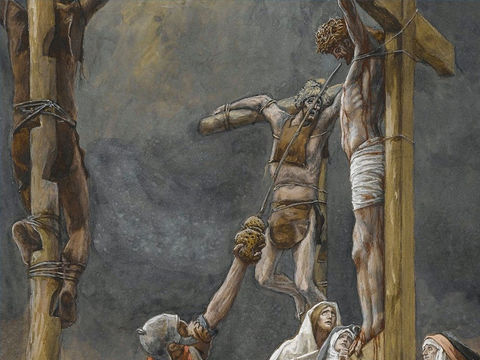John 7:37-39; Matthew 26:36-46
John 19:28-29 28After this, Jesus, knowing that all was now finished, said (to fulfill the Scripture), “I thirst.” 29A jar full of sour wine stood there, so they put a sponge full of the sour wine on a hyssop branch and held it to his mouth.
Jesus fulfilled Scripture by saying, “I thirst.” The Scripture was written in Psalm 69 by King David when, in the Spirit, he prophesied of the Christ. “They gave me poison for food, and for my thirst they gave me sour wine to drink.” (vs. 21) God caused David to write these words about Jesus. It was God’s plan that Jesus thirst. It was God’s plan that Jesus drink sour wine. Yet, his plan involved a lot more than taking a sip of vinegar. That bitter taste that filled Jesus’ mouth was just a token of the bitter cup he drank that day. In the Garden of Gethsemane Jesus prayed that if it were possible His Father take this cup away. This cup was the cup of God’s wrath against all sin; the judgment we sinners deserve.
It is no surprise that Jesus would ask that God take this cup away. He drank this cup by sweating drops of blood in the garden with a soul troubled to death. He drank this cup by permitting others to beat him, mock him, slander him, and spit on him. He drank this cup by permitting nails to be driven through his hands and feet; by being abandoned by God; by bearing the full wait of all our trespasses. It is not surprising that Jesus would ask that he not drink this cup.
Yet, it might be surprising that Jesus did not refuse this cup, although he knew how bitter it would taste. Rather, he said, “My Father, if this cannot pass unless I drink it, your will be done.” Jesus did not refuse this cup of woe, because he had a much stronger thirst than the physical thirst he suffered on the cross: the thirst for our salvation. It is as that Advent hymn says, “Love caused Your incarnation, love brought You down to me. Your thirst for my salvation procured my liberty” Jesus’ fervent desire to rescue us from sin and hell led him to bear greater suffering than any being could imagine. And by his affliction, he satisfied his soul’s desire by seeing to our eternal life.
Jesus thirsted. This means he is a man, a human being like us. He became a human being not to enjoy the pleasures of the flesh, but rather to suffer lack for us. Jesus thirsted in his body in order to satisfy the thirst of our soul forever. Jesus cried, “If anyone thirsts, let him come to me and drink.” Jesus spoke of the Holy Spirit, whom he would give without measure (John 3:34). Jesus said, “whoever comes to me shall never hunger, and whoever believes in me shall never thirst.” (John 6:35) Jesus quenches our spiritual thirst by shedding his blood for us, forgiving our sins and giving us everlasting life.
Jesus gives us an inexhaustible treasure, but just because the treasure is inexhaustible, does not mean that it costs him nothing to give it to us. It is not like the congress that can sign a bill to spend trillions of dollars to give relief to businesses and workers affected by the coronavirus. These senators and congressmen aren’t giving away their own money. It isn’t really costing them anything to give away trillions of dollars. But it cost Jesus dearly to quench our spiritual thirst forever. Our God is the perfect balance of conservative and liberal. He is conservative in that his Word stands firm forever, so that you know you can rely on his promises. Yet, he is so liberal in that he opens the veins of his very Son upon the cross, so that we can drink of the well of salvation and be satisfied (Isaiah 12:3)
Scientists search other planets for water in order to discover extraterrestrial life. Life needs water in order to survive. You can go many days without food, but if you don’t drink water you will die very quickly. This is why even with nails through his hands and feet and life quickly fleeing his body, Jesus thirsted for water. Thirst is the strongest physical desire. Yet, everyone who drinks water dies. We have a more important thirst: a thirst for forgiveness and righteousness; a thirst for everlasting life; a thirst for the Holy Spirit and to be with Christ and His Father forever. And because Jesus thirsted on the cross, all who thirst for this will be satisfied (Matthew 5:6). Through Jesus’ words of forgiveness from the cross, we satisfy our thirst today and we will be satisfied forever. Amen.

 RSS Feed
RSS Feed